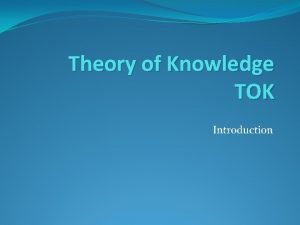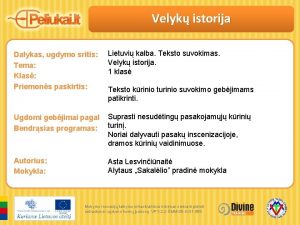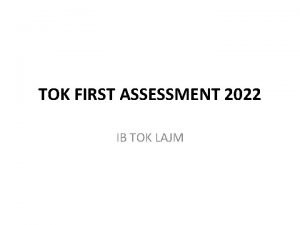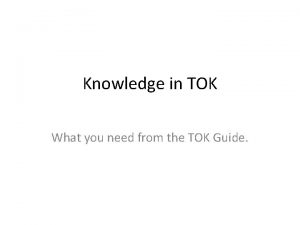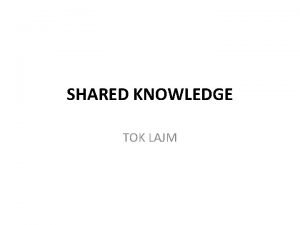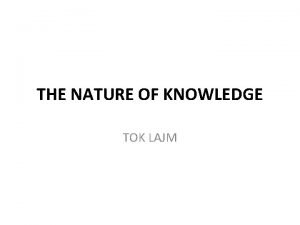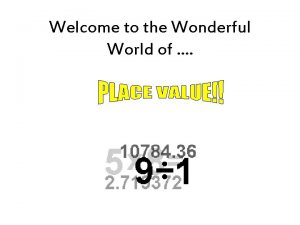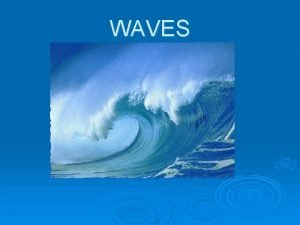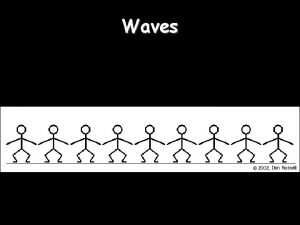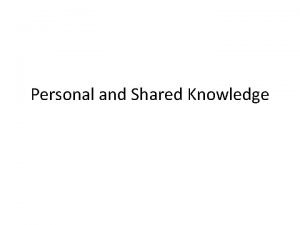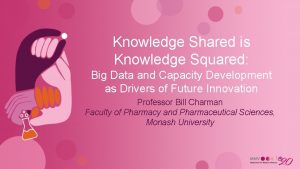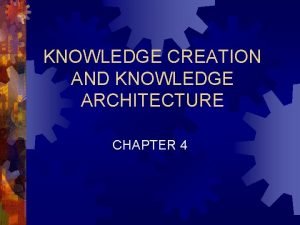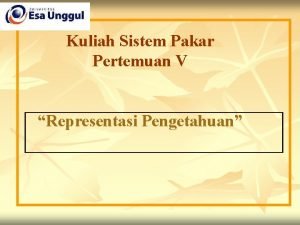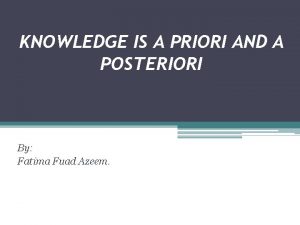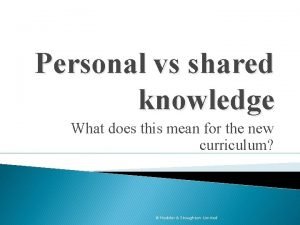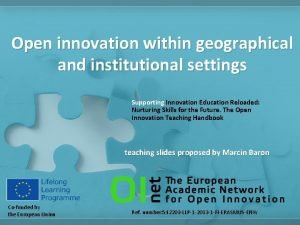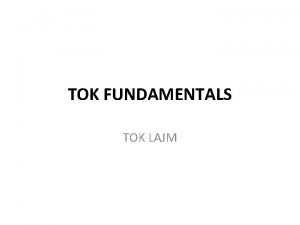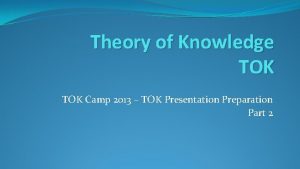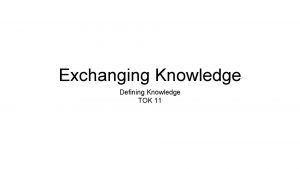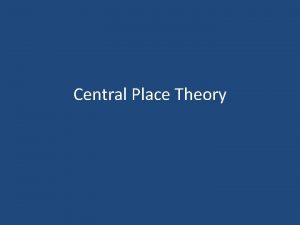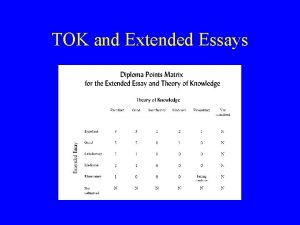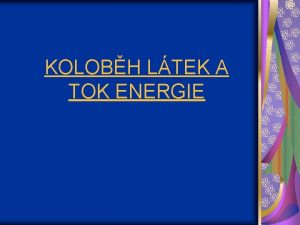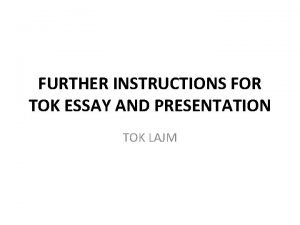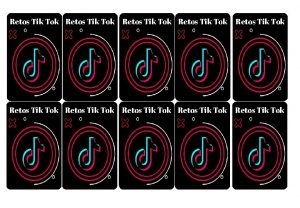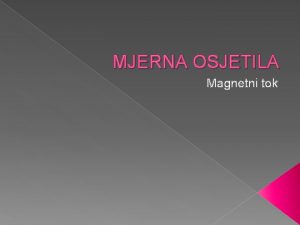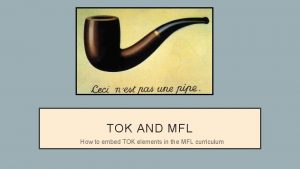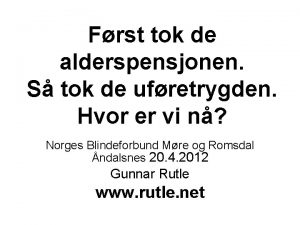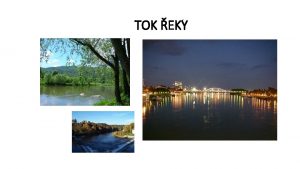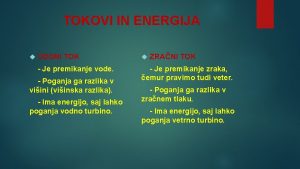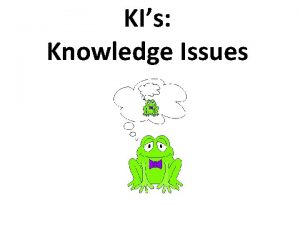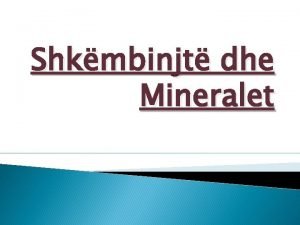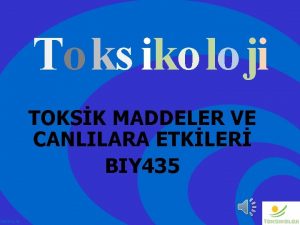Theory of Knowledge TOK Introduction TOKs place in




















- Slides: 20

Theory of Knowledge TOK Introduction

TOK’s place in the International Baccalaureate �Where does TOK fit into the IB curriculum? �The basic idea is that TOK, like the extended essay and CAS, attempts to tie together the subject disciplines that lie in the outside circle. �But how does TOK do this?

The structure of TOK �To understand how TOK helps to tie the IB curriculum together, we first need to understand the structure of TOK. �We can think of the TOK program as beginning in the middle of the diagram, and moving outwards through Ways of Knowing, and then into Areas of Knowledge.

Knowledge and the knower – the big questions of epistemology �Epistemology is an area of philosophy which attempts to answer questions related to knowledge including: �What is knowledge? �What makes a belief reasonable/rational/justified? �What makes an individual human subject rational/reasonable? �What are the pathways to knowledge and rational/reasonable/justified belief? �Another question – not strictly part of epistemology – but interesting to epistemologists nonetheless: What is truth?

What is it to know that …? �What conditions must a belief meet to count as knowledge? �(1) To know that p is at a minimum to believe that p. �Pretty uncontroversial in philosophical circles, although … �(2) But, not all beliefs count as knowledge. �Suppose I believe that the Earth is flat. Does this count as knowledge? �Or, suppose I believe that the Earth is round, but only because I saw the Earth represented as round in a children’s cartoon. Does this count as knowledge? �(3) So, there must be additional conditions that must be satisfied for a belief to count as knowledge.

What makes a belief reasonable/rational? � What makes a belief rational or reasonable? �Is there a difference between rational/reasonable belief and fullblown knowledge? �There does seem to be. �Example 1: � Suppose that, based on the testimony of my chemistry teacher, I form the belief that the chemical composition of water is H 3 O. �Example 2: � Suppose I see a very sheeplike dog in a field, and that based on this observation I form the belief that “There is a sheep in the field. ” � Suppose, however, that the only sheep in the relevant field is out of sight behind a bush. �These seem to be examples of rational beliefs that fall short of knowledge.

What makes an individual rational/reasonable? �There a range of qualities that are usually considered to make an individual rational/reasonable. �Can you think of some? �Examples: �A willingness to consider the views of others. �An ability to assess the strength of evidence. �A reluctance to jump to conclusions. �Etc. �What differences might make one person a better mathematician than she is scientist, and another person a better scientist than he is a mathematician?

What are the different ways of knowing? �Once we have deepened our understanding of the concepts of knowledge and rational/reasonable belief, we will move outwards into Ways of Knowing. In this part of the course, we look at reason, sensory perception, language and emotion, and consider the conditions under which the beliefs that come about through these processes count as knowledge.

Reason versus the senses �The history of philosophy has seen significant debate between empiricists and rationalists. �(Radical) rationalists think that all true knowledge comes through rational reflection/the use of reason. �(Radical) empiricists think that all true knowledge comes through observation/experience. �Which side of this debate would you take? �As we will see later on, one might want to be a rationalist in some areas of knowledge, but an empiricist in others.

Language and Emotion �Language can clearly be used to transmit knowledge: think of everything you have learned via the testimony of others. �Language can also be a barrier to knowledge: think of all the contexts in which language is used to deceive us. �Traditionally, philosophers have thought of emotion as opposed to reason, and thus, as a barrier to knowledge. �More recently, the role of emotion in relation to knowledge has been reconsidered somewhat. �Can you come to know something through having a strong feeling? �Are you more likely to accumulate knowledge on topics that excite you?

Areas of knowledge �When we move out to the subject areas, we move into the area of applied epistemology. �That is, we start to apply our ideas about knowledge and rational belief – and the different pathways to knowledge and rational belief – to specific subject areas.

Example 1: Mathematical Knowledge � What is the nature of mathematical knowledge? � Mathematics seems to have everything, and nothing, to do with the physical world: � If you want to build a bridge that does not fall down, mathematics is invaluable. � However, the truth of mathematical propositions (e. g. “ 2 + 2 = 4”) seems to be completely independent of the physical world (we don’t need to check to world to find out if such propositions are true or false). � How do we acquire knowledge within mathematics? � Through observation? � What kind of observation would falsify a proposition such as “ 1 + 1 = 2”. � Through rational intuition/the use of reason? � As mysterious as the idea of rational intuition is, this answer seems more plausible.

Example 2: Scientific Knowledge �What is the nature of knowledge in the physical sciences? �Are we even interested in truth when it comes to science? �Newton’s physics was used to land human beings on the moon, even though those using it knew at the time that it was false. �How do we achieve knowledge within the physical sciences? �E. g: “Water is H 2 O” �Through rational insight, like in mathematics? �Through empirical observation?

Example 2: Scientific Knowledge �Scientific laws come in the form of universal generalizations. �They have the form “All X’s are Y’s”. �For example, Kepler’s law of equal areas: �But how can you prove that a universal generalization is true? �For example, how can we prove that “All tigers have stripes” is true? �Perhaps can we only know that such claims are false. �It only takes an observation of one stripeless tiger to prove “All tigers have stripes” false.

The big picture �To recap: �TOK starts by asking some very general questions about knowledge and knowers. �It moves on to ask questions about ways of knowing such as reason, the senses, language and emotions. �It finishes up by applying insights regarding knowledge, knowers, and ways of knowing to specific areas of knowledge, or subject areas.

The big picture �So, to return to our original question: How does TOK help tie the IB curriculum together? �Each academic discipline (area of knowledge) involves a body of information (knowledge) and a set of methods of inquiry (ways of knowing). �The material on knowledge and ways of knowing contained within the course gives a framework within which to understand the different methodological choices that we make within the various academic disciplines. �This knowledge, in turn, helps us to understand our own strengths and weaknesses as knowers/learners.

Assessment for TOK �Two components: �Essay � 1, 200 – 1, 600 words in length �Externally assessed �Worth 40 points �Presentation �Around 10 minutes in length �Internally assessed �Worth 20 points

Diploma bonus points matrix

Discussion Questions �Part 1: � Return to the chemistry teacher and sheep in the field examples again. � Do you think the beliefs in these examples count as rational/reasonable? Why? � What feature of true knowledge do you think the beliefs in these examples lack? (Note: It will help to think of some examples of knowledge that you can use as a comparison) �Part 2: � Have another think about the qualities of rational/reasonable individuals given on Slide 7. � What kinds of qualities might we attribute to unreasonable/irrational individuals? �Part 3: � Based on the content of the lecture, what differences do you think there are between scientific and mathematical knowledge? � How might the situation differ again when it comes to literature and the performing/visual arts?

Reading for Session 2 (Week 3) �Nicholas Alchin, Theory of Knowledge … � Preface, Chapter 1, and resource file. �Dombrowski et al, Theory of Knowledge Course Companion … � Chapter 1, Knowing.
 Ee tok matrix
Ee tok matrix Viena karta per velykas atsitiko toks dalykas
Viena karta per velykas atsitiko toks dalykas Tok exhibition essay examples
Tok exhibition essay examples Personal knowledge examples
Personal knowledge examples Indigenous knowledge systems tok
Indigenous knowledge systems tok Shared knowledge tok
Shared knowledge tok Tok personal knowledge
Tok personal knowledge Nature of knowledge tok
Nature of knowledge tok Tok religious knowledge
Tok religious knowledge Millions billions trillions chart
Millions billions trillions chart Transfer transfer
Transfer transfer A disturbance that transfers energy
A disturbance that transfers energy Shared and personal knowledge
Shared and personal knowledge Knowledge shared is knowledge squared
Knowledge shared is knowledge squared Knowledge shared is knowledge multiplied interpretation
Knowledge shared is knowledge multiplied interpretation Knowledge creation and knowledge architecture
Knowledge creation and knowledge architecture Contoh shallow knowledge dan deep knowledge
Contoh shallow knowledge dan deep knowledge A posteriori
A posteriori Book smarts definition
Book smarts definition Knowledge claim
Knowledge claim Gertler econ
Gertler econ
